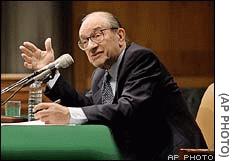
Greenspan: Recovery underway
Fed Chairman's assessment of economy more cheerful than a week ago.
March 7, 2002: 3:03 p.m. ET
|
 NEW YORK (CNN/Money) - Federal Reserve Chairman Alan Greenspan gave Congress a more optimistic appraisal of the U.S. economy Thursday than he did a week ago, saying recent data indicate the first recession in a decade is already over.
NEW YORK (CNN/Money) - Federal Reserve Chairman Alan Greenspan gave Congress a more optimistic appraisal of the U.S. economy Thursday than he did a week ago, saying recent data indicate the first recession in a decade is already over.
"The recent evidence increasingly suggests that an economic expansion is already well under way, although an array of influences unique to this business cycle seems likely to moderate its speed," Greenspan said in his remarks prepared for delivery to the Senate Committee on Banking, Housing and Urban Affairs.
In that regard, his testimony was different from what he told the House Committee on Financial Services on Feb. 27, when he said only that he saw "firming" in economic activity and that the recovery would be slowed down by a number of headwinds.
But in the days since that testimony, a slew of data showing expansion in the long-suffering manufacturing sector, a stabilization of the labor market, surprising strength in fourth-quarter gross domestic product (GDP) and more have convinced many economists -- and, apparently, Greenspan -- that the recovery has already started.

|
|
|
Fed Chairman Alan Greenspan testifying before the Senate | |
"There should be no doubt that Mr. Greenspan's view has changed; he now believes the economy is turning rather than just approaching the turn," said Ian Shepherdson, chief U.S. economist at High Frequency Economics Ltd.
U.S. stock prices were mixed during Greenspan's testimony, but fell after he finished speaking. Treasury bond prices also fell.
To keep consumers spending and help sow the seeds of recovery from a recession that some economists think began in March 2001, the Fed cut its target for short-term interest rates 11 times in 2001.
But the Fed left rates alone at its first meeting in 2002, and many economists think it will start raising rates again some time this year.
"It suggests the Fed is going to be watching closely to see if it is time to start taking back rate cuts," Gary Thayer, chief economist at A.G. Edwards & Sons, told Reuters. "I don't think he is saying that is imminent, but his tone is that it might be sooner rather than later."
But Greenspan also maintained that the Fed still saw challenges to the rebound, and he maintained the Fed's earlier forecast of relatively weak economic growth in 2002 of between 2.5 and 3 percent.
"Certain factors, such as the lack of pent-up demand in the consumer sector, significant levels of excess capacity in a number of industries, weakness and financial fragility in some key international trading partners and persistent caution in financial markets at home, seem likely to restrain the near-term performance of the economy," he said.
In one positive note for the future of business spending -- which economists think will be a key component of the economic recovery -- Greenspan said he sees no evidence of a "credit crunch" for small businesses, and the availability of credit should improve after the economy does.
"The economy is turning, and credit comes in with a lag," Greenspan said. "To the extent that a number of small firms are finding it difficult to get the credit they need at a price they can afford, that's likely to change for the better."
He also addressed the fact that corporate executives are almost uniformly much more gloomy about the state of the economy than he and other economists are.
"They're looking at a very low level of corporate profits, and that's creating a significantly less buoyant view of the outlook than that which most economists, even those who work for corporate executives, have," he said.
Many business leaders blame the Fed's interest-rate increases in 1999 for bringing a halt to business spending and popping the late-90s Nasdaq stock bubble. In response to a lawmaker's question, Greenspan refuted this criticism.
"I don't think we did pop the bubble. We did raise interest rates in 1999, and the reason we did that is that real long-term rates were beginning to rise because the economy was beginning to accelerate," Greenspan said.
He said the Fed responds to the "wealth effect" of high stock prices on economic activity, but it doesn't manipulate it by trying to boost or hamper equity markets.
"We respond to the wealth effect. We do not try, nor do I think we would ever succeed in changing asset prices," he said. "Human nature being what it is, people will value things one way or another. Monetary policy, in the long run, would not have an impact." 
|
| SPECIAL: |
|
|
|
|
|

|

